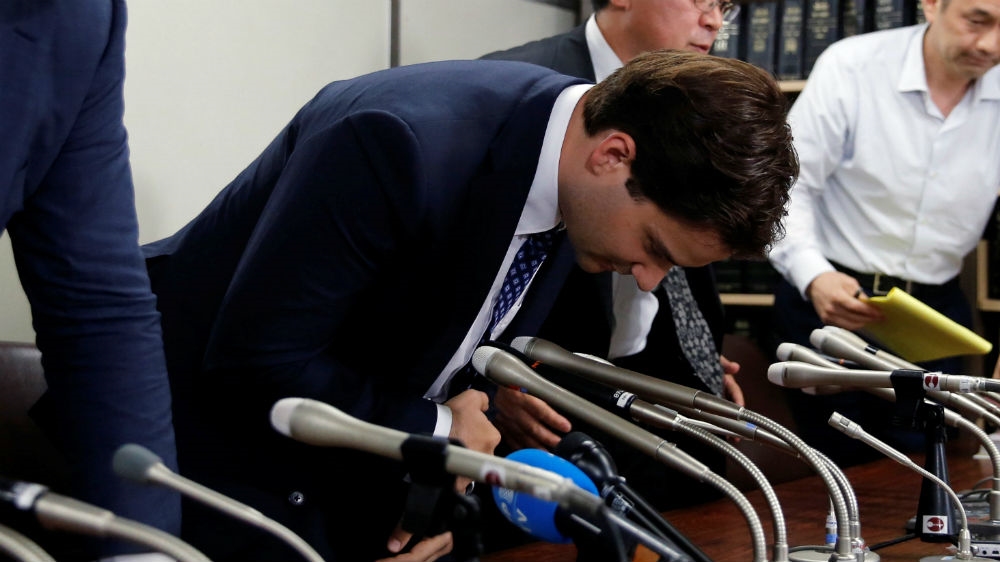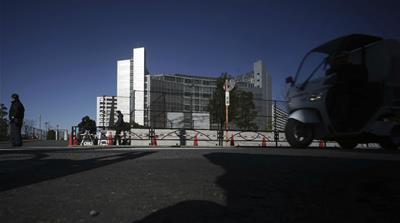‘Hostage justice’: How Japan secures confessions and convictions
Tokyo, Japan – It is a bare, unheated room whose minimal interior details are confined to a bed, a toilet, an iron-barred window and a door without a handle.
The place that Carlos Ghosn now calls home is a far cry from the luxury residences and five-star hotels he was accustomed to as the globe-trotting chairman of Nissan and one of the world’s most powerful automotive executives.
Instead, Ghosn’s world is limited – for the indefinite future – to a simple cell at the Tokyo Detention House, a white 12-storey complex in a northern suburb of the sprawling Japanese megalopolis.
It is here that the ousted Nissan chief has already been held for more than two months after officers dramatically boarded his executive jet to arrest him after the plane landed at Tokyo’s Haneda Airport on November 19.
And it was from his solitary cell that the former auto industry titan also resigned as chief executive and chairman of Renault, paving the way for his successors Jean-Dominique Senard and Thierry Bollore to take the helm.
Confess for bail
But it is not only Ghosn’s unexpected fall from grace or the allegations of financial misconduct that have attracted global attention since his arrest – as his detention drags on indefinitely, the case has also cast a critical spotlight on Japan‘s judicial system.
Last week, Ghosn’s second request for bail was rejected at the Tokyo District Court, despite his promises not to flee the country, hand over his three passports and wear an electronic ankle tag at all times.
|
Nissan chief Carlos Ghosn ‘arrested for misconduct’ |
A reason for the denial was not provided in court but the outcome was unsurprising to experts of the legal system in Japan where bail is rarely granted to defendants without a confession.
Ghosn has vehemently declared his innocence against formal charges of under-reporting his salary for eight years through March 2018 and temporarily transferring personal financial losses to Nissan’s books.
The result? In the absence of a confession, Ghosn – who has already lost seven kilos in weight due to his new prison diet of rice and barley, according to his wife – is widely expected to remain in custody until his trial commences.
His detention has placed the Japanese criminal justice system under international scrutiny – in particular, the practice of detaining suspects without charges for up to 23 days before re-arresting them on separate allegations. Many remain in custody until they either confess or their case comes to trial.
 |
| A court sketch shows Ghosn during a court hearing earlier this month. It was his first public appearance since November. [Kyodo via Reuters] |
‘Hostage justice’
It is this apparent peculiarity of Japan’s judicial system – dubbed “hostage justice” – that some critics have tied directly to the nation’s often quoted statistic that more than 99 per cent of cases that go to trial result in a conviction.
“It’s all about creating an environment that facilitates confessions,” explained Colin Jones, professor of law at Doshisha University in Kyoto. “Under the code of criminal procedure, pre-charge detention is an investigative tool.
“So at an early stage, the detention is in order to facilitate interrogation by investigating authorities who have presumed that someone is guilty.
“Japanese prosecutors rely very heavily on confessions to ensure convictions – and having one in most cases is how they maintain their very high conviction rate.”
Jones expects Ghosn to be detained through trial.
Calls for changes
It is clear that Ghosn’s lengthy detention is far from an isolated case – even if it is among the most high profile in terms of international media attention in recent years.
Official court requests by public prosecutors for permission to detain arrested suspects have soared in recent years, from 72,597 in 1990 to 105,669 cases in 2016, according to a 2017 white paper on attorneys published by the Japan Federation of Bar Associations (JFBA).
While permission rates for detention have dropped fractionally from 99.8 per cent to 96.6 per cent within the same timeframe, the figures show how the outcome generally remains overwhelmingly in support of detention.
“The permission rate for detention is going down slowly but it remains very high,” said Yuichi Kaido, the president of the JFBA’s criminal detention committee.
“In 2017, 62 percent of bail requests were also permitted. This also seems high although maybe 10 or 20 years ago it was less than half,” he added.
Kaido said that the JFBA has been campaigning for changes to Japan’s criminal detention system for 40 years – but change has been slow and inefficient.
“Many lawyers do not support the system but they don’t object to it either – so the voice of opposition is very weak,” he said. “The most important aspect is that in Japan, the period prosecutors can detain suspects is too long – 23 days compared to 24 hours or 48 hours in many other countries.”
Among countless examples is the case of Yasunori Kagoike, the former president of a private school company, who was detained in 2017 alongside his wife for 10 months on suspicion of fraud in relation to a land sale in a major scandal linked to the prime minister’s wife.
Sun-Dye, a musician based in Japan, was held for a similar 10-month period without bail after being arrested on suspicion of stealing 10,000 yen ($91.41) from a store, before a trial acquitted him.
 |
| Mark Karpeles, of Mt Gox, bows as he attends a news conference after a trial on charges of embezzlement in Tokyo in July 2017. A court is expected to reach a verdict in March [Toru Hanai/Reuters] |
As the situation of Ghosn – born in Brazil to Lebanese parents, and also having French citizenship – exemplifies, it’s not only Japanese nationals who are at risk of lengthy detentions.
Mark Karpeles, a Japan-based French citizen who was chief executive of the now-bankrupt bitcoin exchange Mt.Gox, spent close to a year in custody after his arrest in 2015, before being indicted for embezzling around 340 million yen ($3.1m), a charge which carries a 10-year sentence.
His trial ended in December, with the verdict expected in March. Karpeles denies wrongdoing.
‘Shame not pride’
“Lengthy pretrial detention allows prosecutors to isolate and pressure detainees into signing a confession,” said professor Jeffrey Kingston, director of Asian studies at Temple University in Tokyo. “Detainees who claim innocence are subject to prolonged detention until they implicate themselves. Bail is extremely rare for anyone who does not confess.”
Albeit slow, opposition to the system seems to be growing – not only internationally, thanks to cases such as Ghosn’s – but also within Japan.
“This practice is not widely acceptable,” said Kingston. “The local media, civil society and legal advocates have drawn attention to extensive prosecutorial abuses and coerced confessions leading to wrongful convictions. From this perspective, the 99-plus per cent conviction rate is a matter of shame not pride.”
 |
| The centre where Ghosn is held. It is common for suspects in Japan to spend months in detention before their trial [Eugene Hoshiko/AP Photo] |
Along for calling for widespread reform – in particular for the abolition of lengthy pre-charge detentions, as in the case of Ghosn – the JFBA has also urged that interrogations be recorded.
“The current Japanese criminal justice system has various problems in light of the constitution and international human rights law,” the organisation said in an online statement.
“The JFBA has been demanding the eradication of ‘hostage justice’ and the reform of such pre-sentencing detention system …, introduction of the pre-indictment bail system, and the establishment of measures to secure a suspect’s appearance, and other activities,” it added.
For Ghosn – who faces the distinct possibility of turning 65 in his Tokyo cell in March, with many more months of incarceration to potentially follow – such reforms could clearly not happen fast enough.




